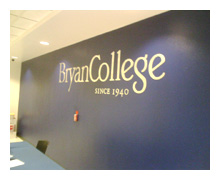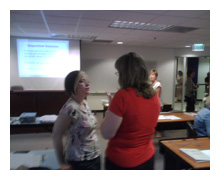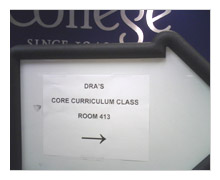A Review of the DRA`s Core Curriculum Class Module I
I had the opportunity to attend the DRA`s Core Curriculum Class Module I of IV this Saturday, May 17, 2008. The flyer was intriguing:
- Ever have a depo dilemma?
- Want to know what you forgot or what you never knew about depos or what you think you know?
- Read back on demand -- yes or no???
Getting There
The Module was given at two locations -- Bryan`s College of Court Reporting in Los Angeles and Downey Adult School - Court Reporting Department. I visited Downey before and you can read all about my speech that I gave there last year here: Downey Court Reporting experience. So even though Downey is closer to my house, I figured that since the Module was being held on a Saturday, that I`d tempt fate and brave the Los Angeles Freeway system. It was a good choice. I got from my home to downtown LA in record time and I easily found Bryan`s College. They are at 3580 Wilshire Blvd -- which is a big high rise building wherein they take up the entire 4th floor. It`s a very, very nice facility and really makes our profession shine. Certainly no offense to any other court reporting program that I`ve visited throughout California, but this has got to be the most executive looking one of them all.
The Module was given at two locations -- Bryan`s College of Court Reporting in Los Angeles and Downey Adult School - Court Reporting Department. I visited Downey before and you can read all about my speech that I gave there last year here: Downey Court Reporting experience. So even though Downey is closer to my house, I figured that since the Module was being held on a Saturday, that I`d tempt fate and brave the Los Angeles Freeway system. It was a good choice. I got from my home to downtown LA in record time and I easily found Bryan`s College. They are at 3580 Wilshire Blvd -- which is a big high rise building wherein they take up the entire 4th floor. It`s a very, very nice facility and really makes our profession shine. Certainly no offense to any other court reporting program that I`ve visited throughout California, but this has got to be the most executive looking one of them all.

The One Minor Glitch
I think the only snafu during this entire Module was that the parking structure was not open for Saturday guests. Maybe the parking lot attendant sleeps in on Saturdays? Who knows. We all had to park on the street -- thank God I had quarters! -- and hoof it to the front entrance. We took a mid-session break to move our cars and even got validated parking stamps. To their credit, the organizers used the parking situation as a real-world example of, âSee, you just never know what you`re going to encounter in this line of work.â Still, for me, it wasn`t that big of a deal.
 The Presenters Were Great
The Presenters Were GreatThe presenters were two ladies: Lois Ludwig and (I apologize, I didn`t get her first name) Mrs. Klein. They are the principals of Ludwig Klein Reporters and can be reached here. After about two minutes I quickly learned that they are tremendously knowledgeable about deposition taking in California. Mrs. Ludwig stated she had more than 30 years experience. She`s probably forgotten more about court reporting than most people even know.

I Came Away With The Good Stuff
I came away with tons and tons of notes: things I knew but needed a refresher; things I didn`t know and am glad I learned. Here`s a sample (in no particular order):
- Get a disclaimer notice signed by an attorney requesting a rough (They even provided a sample disclaimer. Great!!!)
- There are two types of Federal certs: One is when the transcript review is requested and the other when it`s not. And they need to be used correctly. (Again, the samples were much appreciated!)
- List of things to bring with you on a depo. All the usual suspects were on the list, but Mrs. Ludwig says she brings her own chair. Yes, her own chair! The rule is bring whatever is going to make you feel most comfortable to get your job done. (Even your own chair!)
- Police officers don`t need to provide their address but all other witnesses do. (Send it to the police station.)
- When using Backup Audio Media (BAM), don`t record off-the-record stuff. Your Audio Synch can be subpoenaed. Never play back the audio in front of counsel.
- CCP 2025.470 the attorneys must say the words, âsuspend depositionâ so they can then file a protective order.
- When an attorney asks for a portion of the transcript to be made confidential, ask them to clarify when the confidential portion starts and ends. If this is unclear, best practice is make the entire transcript confidential.
- These days attorneys right out of law school seem to know less and less about deposition taking. Thus, it`s our job to know more and more to edu-macate them.
- If an attorney wants to use the âsame stip as before,â then check for previous volumes. If nothing is found in there, go by code.
- If during an interpreted depo, the witness mixes in some English. You must put something like: â(In English) blah blah blah...â The distinction must be made when it was through the interpreter versus their speaking English. In such a case, you can also add the following line in your reporter cert: âreported to the best of my abilityâ or something similar.
- During a telephonic depo, don`t ask the witness to raise his/her right hand unless they`re in the same room as you. Duh.
- Don`t describe anything that you observe. The attorney`s coaching their witness with gestures or rolling his eyes or whatever. Close your eyes to it and just write.
- During a telephonic depo, don`t assume you know who is talking. Always get a speaker to identify.
- During a telephonic depo, ask the questioning attorney to pick up the handset rather than using the speaker phone. Quality will be mo betta.
- If a CSR leaves the depo without custody of the exhibits, they should not be marked as exhibits but as attachments. (Assuming that the reporter received the documents after-the-fact.)
- You should also blurb something along these lines in such a case: â(Not provided to court reporter.) â
- If you arrive at a deposition and no one else is showing up, never leave without calling your agency first. Also, ask to speak with the attorney before leaving.
- Get copy orders on the record. <<_YES YES YES!
- Keep your blurbs short: â(Recess.) (Ending time: 5:00 p.m.) (Telephonic interruption.) (Record reach back as follows.) â
- Never make blurbs like this: â(Attorney and witness confer outside of depo room.)â Why? Because how do you know if they conferred or not. Turn down your inner author and just stick to facts.
- Don`t interpret nods of the head. Some cultures apply different meanings to shakes and nods. What are you, some kind of body language expert?
- Don`t use [sic]. Use quotes instead. Just like you would for a foreign language word.
- Make your rough drafts completely unlike a transcript. No cover, no footers, no cert, no nothing. Just testimony.
- Don`t read back without everyone`s agreement.
- No going off the record without everyone`s agreement.
- No personal comments or opinions are to be given by the reporter. Even (or especially) if the attorney attempts to be friendly and solicit that opinion. Remember all that neutral third party stuff?? Yeah, it`s kinda important.
Two Thumbs Up
In conclusion, this Module I given by the DRA was of tremendous benefit. Everyone should go. I`d highly recommend attending the next one that they give. I know I will. Check out their website for more info.
05/19/2008


